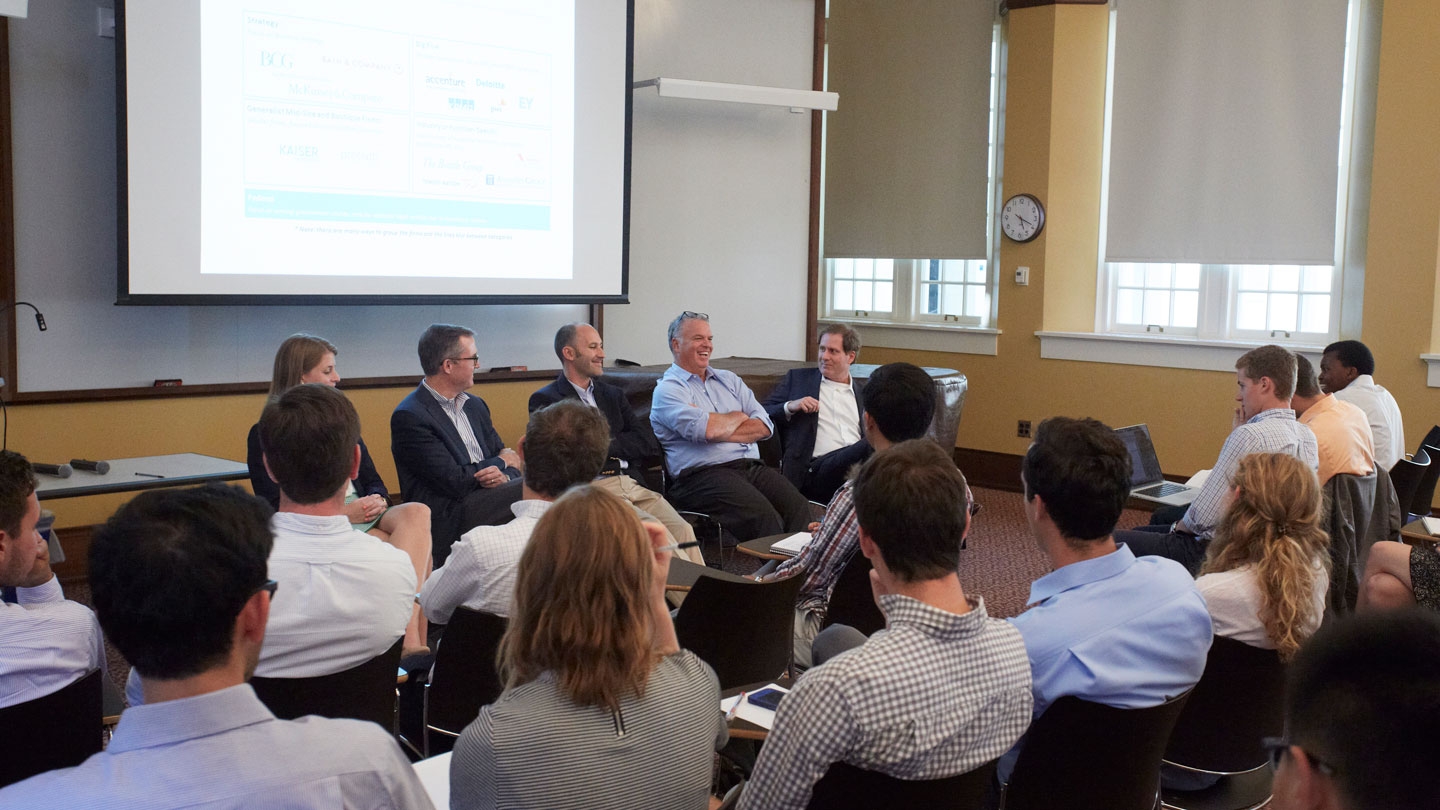Enterprise & Business Program
Mission Statement: The Enterprise and Business (aka “E/B”) Program at Middlebury College provides students with an understanding of how the liberal arts relates to the real world. We seek to eliminate the artificial barrier between “theoria” and “praxis” and between the academy and professional practices. In fact, we enable and empower students to better understand how a liberal arts education is truly the foundation of all business careers.
We offer interdisciplinary courses in enterprise, business, social entrepreneurship, management, and finance—all taught by successful executives and academicians who have real-world experience and a desire to convey their knowledge to students.

A Truly Unique Approach to “Meeting the Moment”: Business & the Liberal Arts
Enterprises of all types highly value individuals who can combine liberal arts skills, leadership skills, and business acumen to carry out their organizational goals. Given the complex world we live in and the hyper competitive global landscape, businesses today crave those who possess both liberal arts skills and business acumen. See examples below:
- A television producer needs to keep control of budgets for a show;
- A neuroscientist needs to lead and manage a large multi-locational team composed of medical and non-medical experts;
- A human rights activist needs to efficiently deliver supplies to refugees, manage volunteers, and fundraise to cover costs;
- A chief medical officer leads and oversees all clinical departments at a hospital;
- An elected State Treasurer needs to understand state and local financial budgets;
- An executive director of an art museum desires to increase foot traffic in her museum and to finance new exhibits; and
- A school principal needs to balance budgets and contain expenditures. Learn more
About our Program & Course Offerings
Upfront, our program is non-degree granting. Our program leverages Middlebury’s existing academic departments and highly regarded faculty. It uniquely complements Middlebury’s amazing liberal arts offerings (e.g. “Literature & the Economy”, “Literature & Class Struggle,” “Race, Capitalism, and Decolonization”; “Neuroeconomics”, “History of Medicine”, “Data Science Across Disciplines”, “Religion & Capitalism”, “Machine Learning”, “Politics and Money,” “The Politics of Taxes”, “International Political Economy”, “Health Economics & Policy”, “”Roman Law”, “Operations Research”, “Philosophy & Law”, “Philosophy of Technology”, “Digital Sociology”, “Sociology of Labor”, “Anthropology of Global Corporations”—just to name a few) rather replaces traditional disciplinary studies by showing students how the skills learned in the liberal arts translate to skills used in business and enterprise.
Our program and courses are designed for all students and majors! For sure, they will prove invaluable to those who intend to assume leadership roles in for-profit, nonprofit, government, and for-benefit enterprises.
Due to overwhelming inquiries and to assist our existing students, our program is currently organized around 9 program areas or themes (e.g., Finance; Organization Studies; Entrepreneurship & Innovation; Nonprofit & Civic Management; ESG Oriented Firms; Public Management & Public Policy; Leadership Studies; International Business; and Sports, Management, and Society) so that students could focus more closely on their topics of interest.
1) Finance—This programmatic theme is for those students who are interested in the art and science of valuing investment securities, small and large-scale projects, companies, programs, and initiatives. This programmatic theme will prepare students for the following areas of finance: asset management, financial markets, investment banking, commercial banking, and industrial organizations. Moreover, students will be exposed to the fundamentals of venture capital, private equity, structured products, mergers and acquisitions, and corporate board designs. For sure, this programmatic theme encourages students to think critically about the role of finance in society and the ethical implications of their financial decisions.
2) Organization Studies—This programmatic theme is for those students who are interested in performance and process improvement inside a wide variety of organizations, including corporations, professional services firms, governmental and nonprofits. Students who focus on this programmatic theme will be prepared to contribute to performance and process improvement initiatives inside many types of organizations, measure and interpret an organization’s performance, assess an organization’s threats and opportunities, and recommend stratagem for improvement.
3) Entrepreneurship & Innovation—This programmatic theme is for those students who are looking to develop and refine their quantitative skills, analytical tools, critical perspectives, and embody experiences that prepare them for careers as solo entrepreneurs, family-business entrepreneurs, or corporate entrepreneurs. Students focusing on this programmatic theme will learn various theory in tandem with practice. This programmatic theme provides students the opportunity to explore the theories, models, and strategies learned in the classroom by creating real business plans, working on other field projects, and gaining access and insight from leaders in the entrepreneurial business community.
4) Leadership Studies—This programmatic theme is for those students who are interested in refining their understanding of group dynamics and effectively leading and managing teams. Students will study the important topics of authority, power, and influence and leverage skills navigating and managing conflicts in organizational contexts and beyond. This programmatic theme aims to study the sources of legitimacy that leaders allege to possess and followers grant in all relationships and contexts.
5) Nonprofit & Civic Management—This programmatic theme is for those who are interested in addressing some of the most pressing and “wicked” challenges (e.g., crime, violence, inequality, immigration, education, mass incarceration, inadequate healthcare, etc) facing our communities today. Those interested work to provide essential services, advocate for social change, and build stronger communities. They recognize that nonprofits are critical to society building and fundamentally to democracy. In addition to learning how to lead and operate a nonprofit organization, students learn how to evaluate social impact (both qualitatively and quantitatively).
6) Environmental, Social, and Governance Oriented Firms--This programmatic theme is for those who desire a deeper understanding of the complex relationships between industrial organizations, the natural environment, and society writ large.
7) Public Management & Public Policy—This programmatic theme is for those interested in serving as a manager in the public sector. The public manager today not only needs to be an effective leader but also is one who is committed to the efficient delivery of public services and amenities to citizens and communities. The public manager is also one who recognizes the importance of understanding policy processes and who could carry out public policy analysis which is not only qualitative but quantitative in nature. Public management professionals work at all levels of government, from local to federal, and in a wide range of areas, including agriculture, food stability and security, environment, education, cybersecurity, law enforcement, military, healthcare, transportation, and public safety.
8) International Business—This programmatic theme is for those interested in how domestic or global corporations navigate complex international landscapes and globalization. More broadly, this programmatic theme is for those globally minded students who are looking to combine and leverage Middlebury’s prized educational resources such as the Rohatyn Center for Global Affairs, cultural and regional studies program, the Middlebury Institute of International Studies at Monterey, its various language schools and programs, its vast study abroad programs, and its truly international and diverse faculty. The programmatic theme supports those who are looking to become engaged citizens, “mind-wide open” innovators, and value-based leaders in the public, private, and nonprofit sectors—both domestic and international.
9) Sports, Management, and Society—This programmatic theme is for those interested in entering the industry of sports. Combining humanistic and social science courses of sports, this programmatic theme will provide formal learning to the role of advertising, economics, organizations, and structure that shape the sports industry.
About Our Faculty
Our core faculty are practitioners with “centrally relevant experiences” and holders of advanced graduate degrees (doctorates and masters) from top universities in the US. Concomitantly, they are holders of professional/industry designations (CFA and CPA) who have been highly successful in their chosen field and who want to give back by mentoring and teaching students. They come from a variety of different backgrounds. They include a former surgeon who pivoted to management consulting with McKinsey & Company in the US and Southeast Asia; a financial analyst and banker (Ralph Lauren Corporation, Texas Commerce Bank/Chemical Bank, BancOne Securities, FleetBoston, Royal Bank of Scotland, and BNP Paribas) who also had the opportunity to serve as a Chief Investment Officer (State of Rhode Island) and Head of Finance, Treasury, and Investments of a university (University of Connecticut); a portfolio manager and equity analyst (Dupont Capital & BlackRock); a venture capitalist (Norwest Venture Partners); and an accomplished CPA holder (PWC) who is passionate about accounting and financial literacy.

Opportunities for Students
In addition to a rich and dynamic classroom environment, we support and encourage students in their exploration of the field on campus and beyond. We work closely with other departments on campus to host accomplished alumni and friends for events and to connect our students with rewarding internships and other experiences. See more.
Our Diversity Pledge
We are committed to fostering a diverse, equitable, and inclusive community.
Consistent with the College’s mission, we strive to educate leaders for various organizations (e.g., for-profit, not-for-profit, and public sector) and beyond. The current milieu demands us to engage with the challenges (especially issues of discrimination, bias, and equity) as we pursue and support the education of purpose-driven and inclusive organizational leaders.
We aspire to create and sustain a welcoming community where diverse perspectives are heard and valued.
